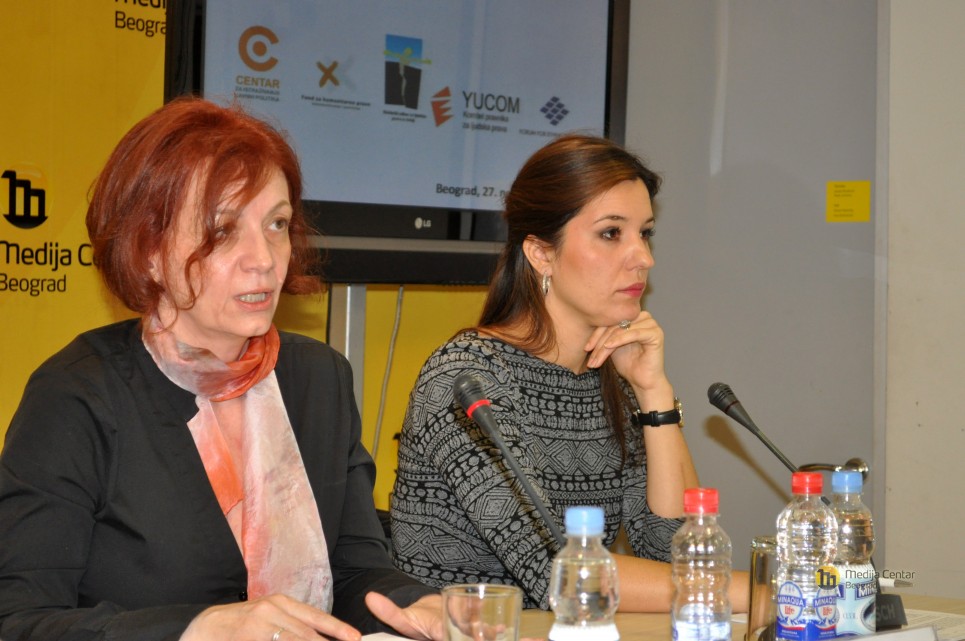Project: Monitoring Serbia’s OSCE Chairmanship27Nov2015
Serbia’s Human Dimension Commitments and the OSCE chairmanship
Public Policy Research Centre, as a member of the Coalition of civil society organizations (CSOs) for monitoring of Serbia’s fulfillment of OSCE Human Dimension commitments, has been following the development with regard to the implementation of these OSCE standards in Serbia. On Friday, November 27th, 2015 in Media Centre, the Coalition presented key points from the reports on situation with the freedom of assembly, elections, rights of Roma and gender equality, freedom of expression, protection of human rights defenders and position of national minorities in Serbia. Additionally, it also announced the OSCE Parallel Civil Society Conference which will take place on the eve of the OSCE Ministerial Council in Belgrade, on 1st and 2nd December 2015. The goal of the conference is adoption of a Declaration and the handover of CSO recommendations to Serbia’s and Swiss OSCE co-chairmanship and future Germany’s OSCE chairmanship.
During the Swiss OSCE chairmanship, a new model of self-assessment in fulfillment of OSCE commitments in the human dimension was introduced. The original suggestion for a chairmanship to prepare evaluation of the situation regarding selected Human Dimension issues was made by the Civic Solidarity Platform, the network of independent NGOs in the OSCE area, which will host the next week’s conference. The self-assessment process consists of three phases: a report on selected themes by independent institutions (in the case of Serbia designated by the Government were the Institute of social Sciences and Commissioner for Protection of Equality), comments of civil society organizations (the Coalition), and responds of competent ministries and governmental offices. In this case, the governmental report is pending and it will not be presented at the Parallel Conference, although it was the practice introduced by the Swiss Chairmanship. The Coalition expects the Government will finalize its comments and organize a separate event by the end of 2015.
Serbia definied four priority themes for monitoring of chairmanship are freedom of assembly, elections, the rights of Roma and gender equality. Additionally, civil society has determined another three themes: freedom of expression, protection of human rights defenders and position of national minorities.
The Coalition’s coordinator Izabela Kisic from the Helsinki Committee for Human Rights in Serbia commented on the challenges in the process of self-assessment, especially the timeframe and selection of topics. Accordingly, she repeted the recommendation madeby the Swiss chairmanshp last year that the Selfevaluation Report should be published at the beginning of the mandate, hence the year of chairmanship might be used for monitoring of implementation of recommendations from report and improvements in certain areas.

Svetlana Djurdjevic Lukic, Director of CENTRE, noted the missed opportunity to promote theOSCE human dimension commitments among the public servants and the general public in Serbia. The OSCE Chairmanship was used to stress the role of the OSCE as an intergovernmental organization burdned with the high politics, neglecting its role in norm building in the area of human rights and democratization. She presented the findings relatet to tje implementation of OSCE commitments in area of position of Roma men and women in Serbia, prepared by the Public Policy Research Centre. She underlined the use of sources from the OSCE reports, civil society, and academic institutions research in the preparation of Report. Ms. Djurdjevic emhasized some improvements, but also countinued perception of institutional discrimination among the Roma population, examples of segregation, and security issues of Roma people when they are newcomers at a particular microlocation. The important aspects of both imployment and security of Roma is the support for their employment in public administration and state institutions and mentioned some steps retated to employment in the police. She paid attention to potential problems in reception of Serbian citizens illegaly residing in the EU memebres states, primarily Roma, to be returned in Serbia according to Agreement on Readmission, in the light of ongoing ‘nigrant crisis’.
Katarina Golubović from JUKOM presented the findings and recommendations related to the freedom of assembly and elections, and Nada Raduški, from the Forum on Ethnic Relation, on the position of national minorities in Serbia.
Report by Danas daily.
The Status of Roma in Light of the OSCE Human Dimension Commitments and OSCE Chairmanship



